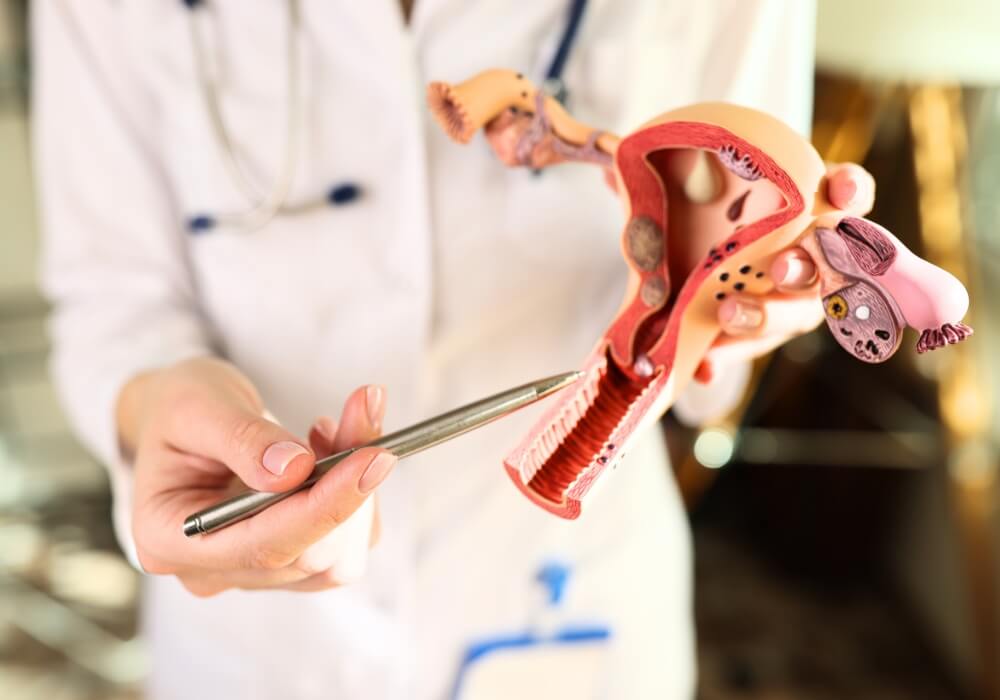For individuals and couples facing fertility challenges, understanding the array of treatment options available is important in navigating this path with confidence and hope.There are a number of different types of fertility treatment options available and each option should be discussed with your care team to determine which is the right choice for you.
Ovulation Induction (OI)
Ovulation Induction (OI) involves stimulating your ovaries to produce one or two dominant follicles, monitoring their growth with ultrasound scans and hormonal blood tests to predict ovulation accurately. This method proves especially beneficial for women facing conditions like Polycystic Ovary Syndrome (PCOS), which often results in irregular or absent ovulation cycles
When opting for Oral Medications as part of Ovulation Induction, such as Clomid, Femara, or Letrozole, these medications work by stimulating the release of follicle-stimulating hormone (FSH) and luteinizing hormone (LH) from the brain, thus promoting the development of one or two dominant follicles. Timed intercourse or, alternatively, intrauterine insemination (IUI), is typically performed shortly before anticipated ovulation, aiming to facilitate natural fertilisation in the Fallopian tube.
It’s important to note that these medications are usually taken daily for five days leading up to ovulation. While they can effectively induce ovulation, they may also induce side effects such as hot flashes, breast tenderness, mood swings, nausea, visual disturbances, headaches, fatigue, and dizziness.
Injectable Medications (Gonadotropins) for Ovulation Induction follow a similar concept to oral medications. However, they are considered when individuals do not respond to oral options.The dose and timing of the medications will be considered by your Doctor based on your medical history. Often the injectable medications are used in conjunction with in vitro fertilisation (IVF) due to their potency and the increased risk of multiple births.
Intrauterine Insemination (IUI)
Intrauterine Insemination (IUI) is a procedure that involves the direct injection of sperm into the uterus, aiming to optimise the chances of sperm meeting the egg. Often utilised in conjunction with ovulation induction to enhance success rates, IUI is particularly beneficial for addressing mild male factor infertility, anovulation, endometriosis, and unexplained infertility.
Studies have demonstrated favourable outcomes with IUI, especially in cases of anovulation. However, the efficacy of IUI may plateau after three to four cycles. Research suggests that up to 95% of pregnancies resulting from ovulation induction/IUI occur within the first three cycles, with 98% within the first four cycles. As such, it’s typically recommended to consider alternative options, such as IVF, if there is no pregnancy after several IUI attempts.
Ultimately, the decision to transition to IVF should be based on individual circumstances and tailored to each patient’s specific needs. Your healthcare provider will work closely with you to develop a personalised treatment plan that aligns with your fertility goals and optimises your chances of success.
IVF
Since the historic birth of the first IVF baby in 1978, over 12 million babies worldwide have been born through IVF/ICSI, as reported by ICMART (ESHRE 2019). IVF stands as a remarkable pathway to parenthood, particularly for individuals grappling with challenging fertility issues that impede natural conception.
The IVF cycle encompasses several key stages:
- Choosing Your Clinic and Care Team: Selecting the right clinic and care team is crucial. Take the time to research and find a clinic that aligns with your needs and values.
- Initial Consultation: At this stage, you’ll have an in-depth discussion with your healthcare provider to develop a personalised treatment plan tailored to your unique circumstances.
- Preparation Phase: A recommended three-month preparation window allows for optimising sperm and egg health through dietary, nutritional, and lifestyle changes, as well as supplementation.
- Ovarian Stimulation: Hormonal medications are administered to stimulate the ovaries and recruit multiple follicles. This phase typically lasts 10-14 days. Once the follicles reach a certain size, a trigger injection is given to facilitate final egg maturation before carefully planned and timed egg collection.
- Egg Collection: The egg collection procedure is minimally invasive and may be performed under light sedation or general anaesthesia, depending on the clinic’s policy.
- Embryo Development: Following egg collection, the sperm is carefully washed and prepared for fertilisation by the embryology team in the lab. The fertilised embryos typically reach the blastocyst stage within 5-6 days, at which point they are prepared for either a fresh embryo transfer or vitrification (freezing) for future use.
Each stage of the IVF cycle plays a crucial role in maximising the chances of successful conception and ultimately achieving your dream of parenthood. Your healthcare team will guide you through each step with care and expertise, ensuring that your journey is as smooth and successful as possible.
ICSI
Intracytoplasmic Sperm Injection (ICSI) is an advanced laboratory procedure in which sperm undergo careful selection and preparation before being injected directly into the egg. This specialised technique is commonly advised to address specific male infertility challenges, including low sperm count, poor sperm motility, or abnormal sperm shape.
ICSI proves particularly beneficial when there are concerns regarding the sperm’s natural ability to penetrate the egg. By precisely introducing the sperm into the egg, ICSI significantly enhances the chances of successful fertilisation. This makes it an invaluable option for couples navigating male factor infertility issues and seeking to overcome fertility obstacles with precision and effectiveness.
Egg freezing
Egg freezing, known as social egg freezing, is a method of preserving fertility by freezing and storing female eggs. Women choose to freeze their eggs for various reasons, including concerns about declining fertility, prioritising career goals before starting a family, or waiting to find the right life partner. Additionally, medical circumstances such as undergoing cancer treatments like radiotherapy or chemotherapy, or dealing with conditions like PCOS, endometriosis, fibroids, or ovarian cysts, may also prompt consideration of egg freezing.
Similar to the process of an IVF cycle, egg freezing involves stimulating the ovaries with fertility medications to produce multiple mature eggs. These eggs are then retrieved, frozen, and stored until the individual is ready to use them, offering a proactive approach to preserving fertility and providing options for future family planning.
Surrogacy
Surrogacy offers a pathway to building a family by having a gestational carrier to carry and give birth to a baby on behalf of individuals or couples wishing to become parents.
Various medical conditions may require surrogacy, including the absence of a uterus, structural issues with the uterus, recurrent pregnancy loss, or unsuccessful IVF attempts. In addition to medical reasons, surrogacy provides an essential option for male same-sex couples or single men who require the assistance of a surrogate to carry their baby to term. This collaborative and supportive reproductive solution offers diverse paths to parenthood, ensuring that everyone has the opportunity to fulfil their dreams of having a family.
Donor sperm may be recommended in various scenarios, including for single individuals looking to conceive or same-sex couples desiring parenthood. Additionally, it is often suggested in cases of very low sperm counts, issues with sperm motility, or in the absence of sperm. Donor sperm may also be considered when there is a risk of genetic abnormalities if the partner carries a genetic disorder or following previous unsuccessful attempts at conception using ICSI due to severe male factor infertility.
On the other hand, donor egg may be advised for women with diminished ovarian reserve or premature ovarian failure, as well as those experiencing poor egg quality impacting fertility outcomes. Couples who have faced repeated failed IVF attempts using the woman’s own eggs may also be recommended donor egg. Furthermore, women at a high risk of passing on genetic disorders may benefit from donor egg, as well as same-sex male couples or single men seeking to build their families through surrogacy.
Additional Laboratory Methods
When undergoing an IVF cycle there are various additional procedures, often referred to as “IVF add-ons,” that have emerged to potentially enhance the chances of success. These supplemental techniques can include procedures such as assisted hatching, endometrial scratching, and pre-implantation genetic testing (PGT). While these add-ons aim to optimise the IVF process, it is crucial for individuals undergoing fertility treatments to carefully consider the evidence supporting the efficacy of each add-on. The decision to incorporate these supplementary procedures should be made in consultation with your Doctor and Embryologist, considering the specific circumstances and needs of the individual or couple undergoing IVF. Thoughtful consideration and evidence-based choices ensure a well-informed and tailored approach to fertility treatment. You can learn more about these add on treatments here : TREATMENT ADD ONS
Remember, each fertility journey is unique, and what works for one person may not be the best choice for another. My goal is to provide you with the information and support you need to make informed decisions. Don’t hesitate to reach out for a personalised consultation, where we can discuss your situation in detail and tailor a plan that aligns with your needs.
References:
Analysis of factors associated with IUI pregnancy outcomes in elderly and young patients. BMC Womens Health. 2024 PMID: 38310215
Predictive factors for intrauterine insemination outcomes: a review. Fertil Res Pract. 2020 PMID: 33308319
ICMART preliminary world report 2019, Human Reproduction, Volume 38, Issue Supplement_1, June 2023, dead093.187, https://doi.org/10.1093/humrep/dead093.187

